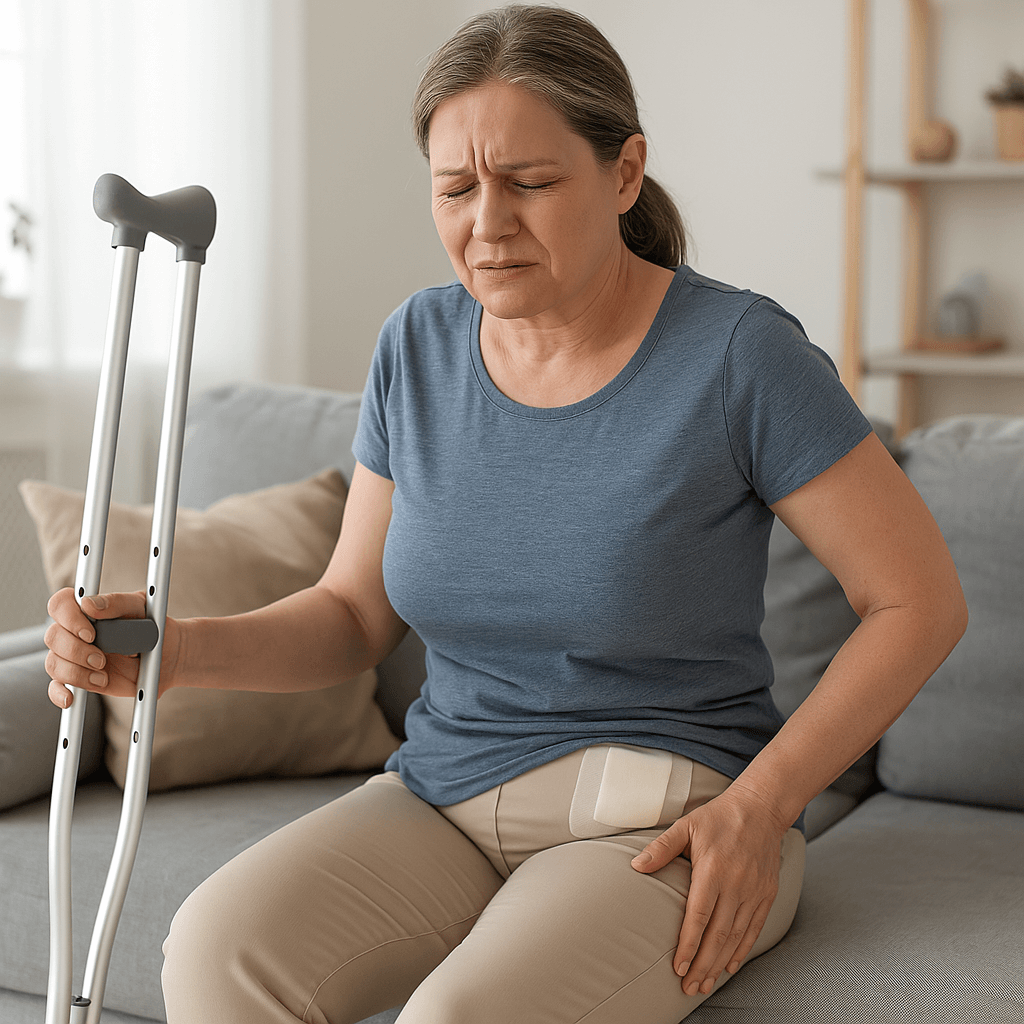Getting Back in Motion: How Long Does Stiffness Last After Hip Replacement? Hip replacement surgery can be life-changing, restoring mobility and relieving chronic pain. But during recovery, many patients are left wondering: how long does stiffness last after hip replacement? Stiffness can be frustrating, affecting everything from your ability to walk comfortably to completing daily activities. This article will explore why stiffness happens, what to expect at each stage, and how to reduce it—so you can confidently work your way back to full function.

What Causes Post-Surgery Stiffness? Understanding the Basics
Before answering how long does stiffness last after hip replacement, it’s important to understand why it happens in the first place. Stiffness after hip replacement is a common part of healing. The body needs time to adjust to the artificial joint, and surrounding muscles, tendons, and ligaments need to regain flexibility.
Several factors can contribute to stiffness:
- Surgical trauma: The tissues around the hip have been disturbed, which causes inflammation and tightness.
- Scar tissue formation: Scar tissue can limit mobility if not properly managed.
- Delayed rehabilitation: A slow start to physical therapy may result in reduced range of motion.
- Pre-surgery limitations: If your hip was already stiff before surgery, it might take longer to improve afterward.
So, how long does stiffness last after hip replacement? Let’s break it down by stages of recovery.
How Long Does Stiffness Last After Hip Replacement: The First Few Weeks
Immediately after surgery, it’s normal to experience stiffness and limited movement. During the first 1–2 weeks, your body is focused on healing from the operation. Pain, swelling, and tightness are common.
At this stage:
- Physical therapy begins early, often within 24–48 hours post-surgery.
- You’ll be encouraged to walk short distances with assistance.
- Range-of-motion exercises help reduce stiffness.
If you’re asking how long does stiffness last after hip replacement in the short term, expect tightness to be noticeable for up to four weeks. However, gradual improvements begin within the first two weeks if you follow your rehab plan.
1–3 Months After Surgery: What’s Normal for Stiffness?
By the one-month mark, many patients see a significant reduction in stiffness. But it’s still common to experience tightness in the hip joint, thigh, or buttocks.
During this phase:
- Your hip range of motion should steadily improve.
- Pain should be decreasing, but stiffness may persist—especially in the morning or after sitting.
- Patients are often transitioning from walkers to canes or walking unaided.
So, how long does stiffness last after hip replacement during this middle stage? For many people, moderate stiffness can linger for up to three months. This is when consistency in physical therapy makes a huge difference.
3–6 Months Post-Op: Regaining Strength and Flexibility
Between 3–6 months, most patients feel like themselves again. Mobility returns, walking becomes easier, and daily activities are less restricted.
But even at this stage, you might ask: how long does stiffness last after hip replacement if I still feel tightness?
Some patients still experience residual stiffness, especially if:
- They had severe joint damage before surgery.
- Scar tissue is affecting flexibility.
- Their rehab program hasn’t been aggressive enough.
Stiffness at this stage is usually manageable and can often be improved with advanced physical therapy techniques, such as:
- Deep tissue massage
- Hydrotherapy
- Stretching routines
- Targeted strengthening exercises
Beyond 6 Months: When Should You Be Concerned?
By six months, many people are back to normal or close to it. However, if you’re still dealing with significant stiffness, you might wonder, how long does stiffness last after hip replacement if something isn’t right?
Persistent stiffness beyond 6 months could point to:
- Improper implant positioning
- Excess scar tissue (arthrofibrosis)
- Muscle imbalance or weakness
- Underlying medical issues like infection or nerve problems
In rare cases, a surgical revision may be necessary. However, most stiffness issues can be resolved with an updated rehabilitation plan and possibly a consultation with a specialist.
How Long Does Stiffness Last After Hip Replacement in Older Adults?
Age plays a role in recovery speed. Older adults often wonder, how long does stiffness last after hip replacement if I’m over 65?
Recovery timelines vary, but:
- Older adults may need extra time due to slower tissue healing and reduced muscle mass.
- Balance issues or pre-existing conditions (like arthritis or diabetes) can contribute to stiffness.
- However, many older adults still recover full or near-full range of motion with proper support.
The key is patience, consistency, and open communication with your care team.
What Can You Do to Reduce Post-Hip Replacement Stiffness?
Now that we’ve covered how long does stiffness last after hip replacement, let’s talk strategy. Here’s how to actively reduce stiffness:
1. Stick to Physical Therapy
This is the most crucial part of your recovery. Exercises targeting the glutes, hamstrings, and hip flexors improve mobility and strength.
2. Use Heat Therapy (When Approved)
Warm compresses or heating pads can help loosen tight muscles around the joint. Always get approval from your surgeon first.
3. Incorporate Gentle Stretching
Daily stretching keeps scar tissue from limiting your range of motion. Focus on hamstrings, quads, and hip rotators.
4. Stay Active (But Don’t Overdo It)
Walking, swimming, and cycling are low-impact ways to stay mobile. Too much rest can actually increase stiffness.
5. Consider Anti-inflammatory Support
Talk to your doctor about safe use of NSAIDs or natural options like turmeric or omega-3s to help with inflammation and tightness.
Realistic Expectations: Everyone’s Timeline Is Different
Even though we’re answering how long does stiffness last after hip replacement, it’s important to remember that recovery varies for everyone.
Some people regain full range of motion in just a few months. Others may need a full year, especially if they had limited mobility before surgery. Your personal healing journey depends on:
- Your activity level
- Overall health
- Surgical technique
- Adherence to rehab
Try not to compare your timeline to others. Progress might be slower than you’d like, but it’s still progress.
Final Thoughts: How Long Does Stiffness Last After Hip Replacement?
So, how long does stiffness last after hip replacement? Here’s the big picture:
- First 1–4 weeks: Expect significant stiffness, gradually improving with therapy.
- 1–3 months: Mobility improves, but mild tightness may persist.
- 3–6 months: Most patients experience near full recovery; lingering stiffness is usually minor.
- After 6 months: Persistent stiffness should be evaluated but often improves with targeted treatment.
The answer isn’t the same for everyone, but understanding what’s normal—and what’s not—can help you take the right steps toward recovery.
Stick with your rehab, be patient with your body, and remember: with the right support, a stiff hip today can become a strong one tomorrow.
